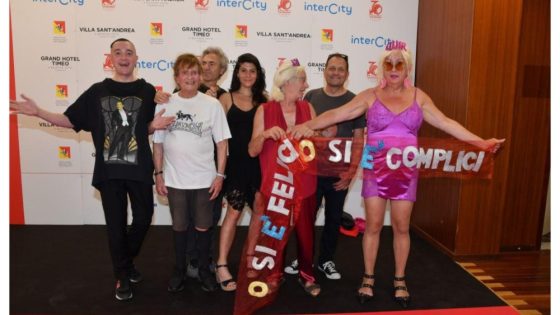Italian filmmaker Nicola Bellucci’s documentary “Quir” – a phonetic spelling of queer – tells the story of a gay couple, Massimo Milani and Gino Campanella, living and making handbags in the Sicilian city of Palermo, who have become icons of the Italian gay movement. The film had its premiere this week at the Taormina Film Festival.
Bellucci met his subjects during COVID by pure chance. “I got to know Massimo and Gino as I was walking through Balarò, this unique neighborhood of Palermo, which is very well known and multi-ethnic, and I came across this small shop, full of color and materials, and different spellings of the word ‘Quir,’ and I thought to myself, what is this?,” he tells Variety.
“I went in and I saw Massimo with this beautiful miniskirt and blonde wig and I got talking to him and how he and Gino were getting married. How they’d been part of the first gay movement in Italy in the 1970s – in Turin in 1976 – and the 80s and of the deaths that had happened of young men. I saw immediately the opportunity to make a film about a historical movement in Italy of the last 50 years. I love making films about the wrong things at the wrong moment, when the time has gone by, told by people from the margins of society.”
The people Bellucci references gather around Milani and Campanella’s shop, which has become a refuge and a resource for the young trans and gay community of Palermo. Vivian Bellina, a young trans woman, seeks advice and a sympathetic hearing as she tries to work out her life, while Charly Abbadessa, a former actor caught in a whirl of memories, relates stories of his Hollywood days with Tony Curtis, Marilyn Monroe and Rock Hudson.
Bellucci says: “It begins to seem like a film of fiction with these other characters, because they really are characters. They are all involved in thinking about their identities and performing and changing like characters in a film.”
Having attended the premiere in Taormina, Milani told Variety: “It was really moving to see it in front of an audience. Our lives passed in front of our eyes on the screen. This is the most beautiful thing that cinema can do.”
For Milani, the film is part of his and Campanella’s own political struggle. “When we realized that we were marginalized, we understood that our life was always part of the LGBTQ+ community, so all of our actions were personal and political. So we want the complexity of the world that we’ve lived to come out. We’ve seen a lot of people fall, because of suicide, because of oppression by the fascists, because of violence. Gays were sent to concentration camps; treated as mentally ill. We’re responsible also for them. The film is a consequence of our life, so we were very happy to see it.”
Ernesto Tomasini, another friend of Milani and Campanella’s, is an internationally respected singer and actor who puts his career on hold to care for his ailing mother. In between doing the more mundane tasks he also performs for her often befuddled amusement. It speaks to a theme Bellucci sees as fundamental to the film: “The point of the film is to take care of each other. Everyone in the film has to take care of someone. Massimo and Gino take care of each other, but also other people. Ernesto takes care of his mother. Charly abandons his career to come back to Sicily to care for his mother. There’s some writing on the wall outside the shop which reads ‘The work of caring is work.’ Massimo and Gino don’t just sell handbags; they’re care workers in a very real sense.”
Pictured above: Ernesto Tomasini, Charly Abbadessa, Nicola Bellucci (director), Vivian Bellina, Gino Campanella, Frank Matter (producer), Massimo Milani
Source Agencies



